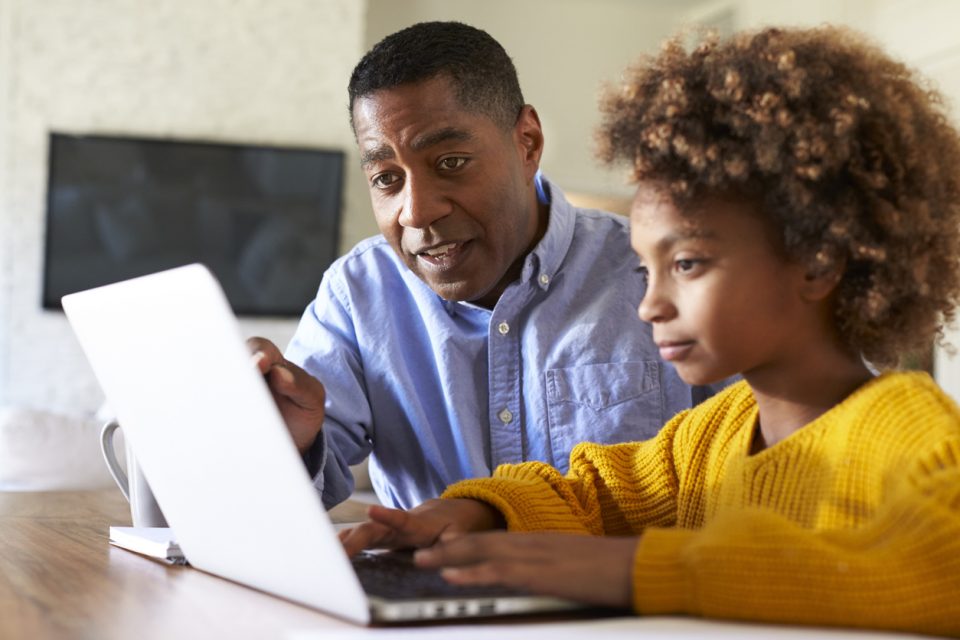As parents, we usually do everything we can to keep our children safe and healthy, from teaching them to ‘slip, slop, slap’ before going outside in the heat, crossing the street carefully, and always wearing a helmet when cycling. But how are you protecting them against bullies, predators, and nasty stuff on the internet?
Let’s face it; the internet is here to stay. With 83% of teenagers using the internet three or more times a day (and this number is rising as more teens acquire smartphones), it’s time to add some cyber safety knowledge to your parenting toolkit, if you haven’t already. Here are few points to help you the most.
Read: Tips To Protect Your Business Against Cyber Crime
1. Discuss your child’s internet activities with them openly

As soon as your child begins to use the internet, discuss what they’re reading, viewing, and talking with online and continue the conversation as they get older. Ask your child what websites or apps they use, make a list, and go over it with them. Share with your child about what you think is appropriate, and remind them that other parents and their children may have different ideas.
Remember, after some years, your kids will need to access the internet outside too of the safety of their own home, and you want them to be ready.
Read: Samsung Galaxy Watch 4 Series Unpacked Today
2. Keep screens and devices in plain sight.
Always keep strict control on your kid’s online activities, especially if they are young. Place the system in a central location in the house so you can easily monitor what your youngster is doing and viewing online. You can set your mobile devices to forget Wi-Fi passcodes so your children can’t surf online without your knowledge. You might also try to agree that no tablets, computers, or gaming devices are allowed in bedrooms.
Read: How To Fix Google Chrome Crashes On Mac?
3. Be familiar with your parental controls.
Simple online searches can lead to less-than-innocent outcomes. Therefore, it’s our job to understand how to use the parental controls/search limits provided by web browsers, internet service providers, and gadgets. Parental controls can help your child from not seeing and accessing the most violent or sexual material. In addition, paid security tools and features will provide additional security and management.
Read: How To Password Protect Folders And Files On Mac?
4. Be aware of your children’s internet friends.

As adults, we are aware that some individuals on the internet are not who they claim to be, but children and teenagers can be alarmingly known about who they are talking or chatting with if they are not trained to be cyber smart from a young age. So make friends and contacts in your child’s social media circles, and keep an eye on what they’re posting. Your children may object, but explain that this is one of the criteria for you to get them access to the internet.
Read:5 Best Mac Cleaner Software & App In 2021
5. To preserve your privacy, be ‘share aware.’
If your child is using social media very often, they must be aware of the potential of personal information or photographs being made public once they have been posted. You should teach kids to be cautious and thoughtful about what they post and share online, even if they don’t completely comprehend the ramifications of sharing personal information online. Please encourage your children to consider whether the data (i.e., name, phone number, home address, email, school name) or photo they are sharing is something they would provide to a stranger before posting it.
Read: How To Keep Your PC Safe When Working Remotely
6. Maintain control over your family’s online presence
Every photo and personal detail shared on social media, and the internet contributes to an individual’s digital footprint. The significant danger here is that once information is released publicly, it can be exploited in unexpected and uncontrollable ways. Therefore, it would be best to consider that whatever you post on the internet is permanent (it can be erased in some cases, but not usually before others have seen it and saved it).
As a result, children and young people must exercise caution in safeguarding their photographs and information. The same may be said for parents who publish images of their children on social media frequently.
Read: Tips To Protect Your Business Against Cyber Crime
7. Teach your kids to keep their whereabouts confidential
Geo-tagging is a feature found in most apps, networks, and gadgets that makes your location public and can bring someone to you. These functions should be disabled for most reasons of privacy and security. In addition, digital images’ metadata (information regarding the time, date, and GPS coordinates) may expose more than you want. Some social media platforms, but not all, automatically hide or remove this data, so do your research and know how much information you have.
Read: Best Kindle Deals right now on Amazon
8. Keep track of how much time you spend online

According to the Australian Physical Activity and Sedentary Behavior Guidelines, children who are between the ages of 5-17 should have not more than two hours of screen usage each day. As a result, it’s critical to watch your child’s online activity, especially if they’re younger, to ensure they don’t establish unhealthy habits. You should also turn off the home Wi-Fi at a specific period each night (preferably before bedtime) so that everyone can take a break from the computer.
Interesting News: Cool Google Tricks You Need To Try Out When You Are Bored
9. Use #SocialNetworkSavvy to your advantage.
Always keep updated on how to stay safe on social media so you can give your children the most significant advice. Learn how to use the privacy settings and reporting options on the social networks and applications that your children use. Discuss how they can keep safe on social media, such as communicating to a trusted adult if they are concerned, and understanding what constitutes online bullying, both as a perpetrator and as a victim.
Also Read: How to make your own Facebook Avatar
10. Set a Good Example

Became a role model for your children by following the healthy online habits you want them to exhibit. For example, they are more likely to follow in your footsteps if they witness you being cautious and respectful online. Yes, this includes setting a screen time limit for yourself.
Also Read: How to Block Email Tracking




































